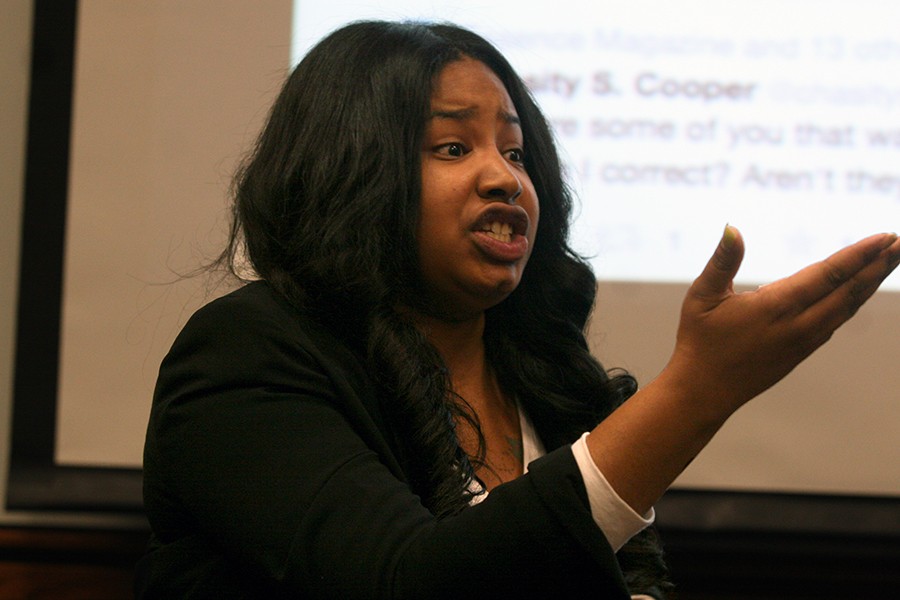Real sorority sisters hash out VH1’s ‘sorority sisters’
Brittany Fisher, a senior political science, discusses her stance on the misrepresentation of her sorority on the VH1’s show ‘Sorority Sisters’ during the Real Sorority Sisters Discuss “Sorority Sister” Monday in the auditorium of Lumpkin Hall.
February 10, 2015
Audience members were left speechless when shown a clip from VH1’s TV series “Sorority Sisters,” which many – including the seven women on panel – felt was an embarrassment to their organization at Monday’s forum.
Hosted by Zeta Phi Beta sorority, “Real Sorority Sisters Discuss: ‘Sorority Sisters,’ was a forum discussion about the controversial show that aired on VH1.
“Sorority Sisters” was a VH1 reality TV series that featured post-collegiate women who were members of the four historically black female Greek organizations: Alpha Kappa Alpha, Delta Sigma Theta, Zeta Phi Beta and Sigma Gamma Rho.
Because of the controversy and backlash from some of the Greek national headquarters of these sororities, as well as community outcry from black Greeks, the show was canceled and many of the members on the series bwere expelled or suspended from their organizations.
Many of the women on the panel did not watch all 10 episodes of the show; most watched only the first episode, lost interest or completely and boycotted the show.
Yolanda Williams, a gateway advisor and member of Zeta Phi Beta sorority said the show misrepresented the group.
“That’s not what our organizations are about and that’s not who we are,” Williams said.
The panel debated similarities between the show and other series such as “Real Housewives of Atlanta” and “Love and Hip-Hop.” Some felt there was no difference between “Sorority Sisters” and those shows in regards to how they acted, but the main concern was the women’s proud announcement of their Greek affiliation, which audience members said left a bad taste in their mouths.
“If they showed our real life, it would have only lasted one episode,” Williams said.
Brittany Fisher, the president of Delta Sigma Theta, said that was the biggest difference between that show and “Love and Hip-Hop” because they were representing organizations, which had the potential to have those who are non-Greek look at Greeks as something undesirable.
Fisher said everything on TV is for entertainment, but how the girls acted showed the overall organization in a bad light. She said because she is a Delta, she is no longer just “Brittany,” she is “Brittany, the Delta.”
Williams, who was inspired with how the national headquarters got the show off the air, said because they made it happen, they could do more as an organization having a larger voice in the nation.
“We made that happen, we can change the world,” Williams said.
One student in the audience, Kendall Jackson, a senior family consumer science major, said he didn’t support the women on “Sorority Sisters” because of how they represented the organization, but he did support the show.
Jackson said the women on the show appeared as a representation of their Greek organization, rather than the individuals they were before joining the group.
Mona Davenport, the director of minority affairs and a member of Delta Sigma Theta sorority, said “Greekdom” is not for everyone and there are some within each of the organizations on a national level that may not have the best individual personalities. However, she felt those who attempt to join do truly want to do service for their community.
The notion that each of the organizations are also a business was brought up and all of the members agreed.
Majarrie Marshall, a junior communication studies major, said. “All the organizations are a business, if someone is coming at my empire I’m going to shut it down.”
One member in the audience, Zach Booth, a sophomore communication studies major, said as a non-Greek he found the show to be entertaining, but he understood why the women were all upset and its cancelation. However, because he knew of the organizations prior to watching the show, he did not get the impression that the women in the series represented all black female Greeks.
JaLisa Smith, the president of Sigma Gamma Rho sorority, said those on campus who are in the Greek organizations have jobs that they do outside of what the average person on campus sees.
“Y’all don’t see all the things we do,” Smith said.
Roberto Hodge can be reached at 581-2812 or [email protected].





















































